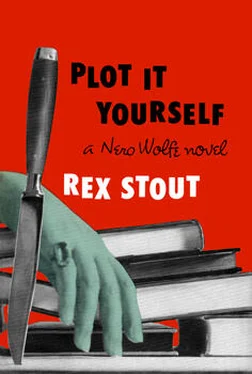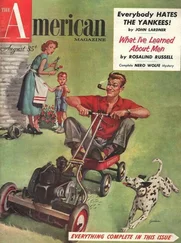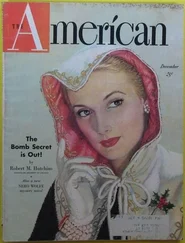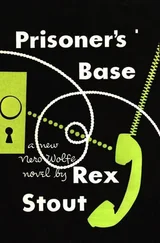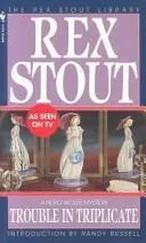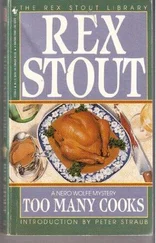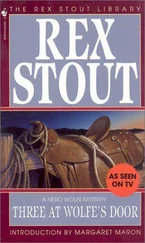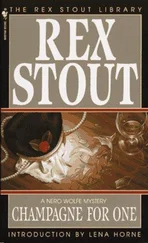That building, between Lexington and Third, was a house of a different color. It may have been nearly as old as the 21st Street tenement, but it had used make-up. Its brick front was painted silver-gray with bright blue trim, the doorframe was aluminum, and there were evergreens in boxes. There were eight names on the panel in the vestibule, two tenants to a floor, with a grill to talk through and a receiver on a hook. I pushed the button opposite Rennert and put the receiver to my ear, and in a moment had a crackle and then a voice.
“Who is it?”
“You don’t know me. My name’s Goodwin. Nothing to sell. I may want to buy something.”
“Bill Goodwin?”
“No. Archie Goodwin.”
“Archie? Not by any chance Nero Wolfe’s Archie Goodwin?”
“In person.”
“Well, well! I often wonder what detectives buy one-half so precious as the goods they sell. Come on up and tell me! Top floor.”
I hung up and turned, and when the buzz sounded opened the door and entered. More aluminum, framing the self-service elevator. I stepped in and pushed the “4” button and was lifted. When it stopped and the door opened he was there in the little hall, shirt sleeves rolled up and no tie, virile, muscular, handsome, looking younger than thirty-four. I took his offered hand and returned his manly grip and was ushered through a door and was in the nice big room. It was even nicer and bigger than the report had led me to expect. He had me take a nice big chair and asked, “Scotch, rye, bourbon, gin?”
I declined with thanks, and he sat on a nice big couch which probably doubled as a bed. “This is a pleasure,” he said, “unless you want my fingerprints to compare them with the ones you found on the dagger that was sticking in the back of the corpse. I swear I didn’t do it. I always stab people in front. I like that suit. Matthew Jonas?”
I told him no, Peter Darrell. “Fingerprints wouldn’t help,” I said. “There were none on the dagger. It was one of those old Arabian antiques with a fancy handle. What I told you was straight. I may want to buy something — or rather, a client of Nero Wolfe’s may. He’s a guy with money who wants more. He gets ideas. He has the idea that he might like to buy your claim against Mortimer Oshin and Al Friend for stealing your play outline, ‘A Bushel of Love,’ and turning it into A Barrel of Love. He might pay ten thousand cash for an assignment of the claim and your affidavit supporting it, and another ten thousand if and when Oshin and Friend pay up. Of course he would expect you to testify without a subpoena if it goes to trial.”
“Well, well.” He stretched a leg on the couch. “Who is this fairy godfather?”
“A client of Mr. Wolfe’s. We handled a problem for him once, not this land. If we agree on a deal you’ll meet him. The ten thousand is ready in bills.”
“What if they never pay up?”
“That’s his risk. He would be out ten grand.”
“Nuts. They’ll pay. They’ll pay ten times ten. At least.”
“Possibly,” I conceded. “Some day. If it goes to trial, there’ll be lawyers’ fees and other expenses.”
“Well.” He put his other leg up. “Tell him I might be interested. I’m willing to meet him and discuss it with him.”
I shook my head. “I’m here to discuss it. The reason he got Mr. Wolfe to handle it, there are a couple of little details to arrange. For one, he would like to have some evidence in his possession that that’s not the only dramatic plot you ever hatched. That should be easy. I suppose you have copies of some of your television scripts.”
“Sure. All of them.”
“Fine. That would settle that. The other one, if it gets to court, it would help a lot to have some backing for your testimony that you wrote the outline with your name on it that was found in Jack Sandler’s office files, and the best backing would be to produce the typewriter that you wrote it on. Our client would want it. Of course he would pay you for it.”
“That would be sweet of him.”
“He’s not sweet. Between you and me, I don’t like him.”
“Neither do I. He stole my play.” His legs swung around and he was on his feet. “All right, Hawkshaw. Beat it.”
I stayed put. “Now listen, Mr, Rennert. I can understand how you—”
“I said beat it.” He took a step. “Do you want help?”
I arose and took two steps, and was facing him at arm’s length. “Would you like to try?”
I was hoping he would. Wolfe’s mutiny had put me in a humor that would have made it a pleasure to take a swing at somebody, and this character was the right size and build to make it not only a pleasure but good exercise. He didn’t oblige me. His eyes stayed with mine, but he backed up a foot.
“I don’t want to get blood on the rug,” he said.
I turned and went. As I was opening the door he called to my back, “Tell Mortimer Oshin this is like one of his lousy plots!” The elevator was still there, and I stepped in and pushed the button.
On the sidewalk I looked at my wrist: 4:05. Carmel was only a ninety-minute drive, and it would be good for my nerves, but I would phone first. What was Alice Porter’s number? I stood at the curb and closed my eyes and concentrated, and dug it out of the cell that had filed it. Around the corner on Lexington Avenue I found a booth, dialed, counted fourteen rings, and hung up. No answer. I settled for a shorter drive. I hoofed it crosstown to Tenth Avenue and a block south to the garage, got the Heron sedan, which was Wolfe’s by purchase but mine by mandate, and headed for the West Side Highway.
It was now twenty to one in my book, or maybe thirty to one, that Kenneth Rennert was not it. Whoever had planned and handled the campaign, writing the stories and picking the accomplices and taking advantage of the different circumstances for planting the manuscripts, was no fumbler, but Rennert was. Having suspected, or decided, that Mortimer Oshin was Wolfe’s client and I was trying to slip one over, which had not required any strain on the brain, if he had been half smart he would have played me along instead of bouncing me. He was just one of the chorus, not the star. I had filed him away by the time I left the Henry Hudson Parkway at Exit Eleven.
Riverdale, whose streets were planned by someone who couldn’t stand the idea of a straight line, is a jungle for a stranger, but I had a good map and only had to turn around twice on my way to 78 Haddon Place. Rolling to the curb in front, I gave it a look. There was too much bigger stuff, everything from tulip beds up to full-grown trees, to leave much room for lawns, but what grass there was would have been fine for putting practice. The house was stone up to your chin and then dark brown wood with the boards running up and down instead of horizontal. Very classy. I got out and started up the walk.
Hearing music as I neared the entrance, I stopped and cocked an ear. Not from inside; from the left. I took to the grass, rounded a corner of the house, passed a row of windows, turned another corner, and stepped onto a flagged terrace. The music, coming from a portable radio on a chair, had an audience of one: Jane Ogilvy. She was stretched out on a mat, on her back, with none of her skin covered except minimum areas at the two vital spots. Her eyes were closed. The deduction I had made from the photographs, in which she had been dressed, that she had a nice little figure, was confirmed. She even had good knees.
I was deciding whether to retreat around the corner and make another approach with sound effects, or stay put and cough, when her eyes suddenly opened and her head turned. She squinted at me five seconds and spoke. “I knew someone had come. The felt presence though not perceived. You’re real, I suppose?”
Читать дальше
